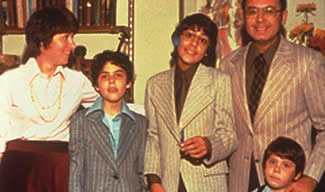Hidden Gems: Capturing the Friedmans
By Walid Habboub
November 30, 2004
Child sexual abuse is the most difficult subject matter a filmmaker can ever tackle. It becomes especially difficult when the film being created is a documentary featuring real people and real events. Such a serious topic requires a delicate and even-handed approach that keeps the story from being over dramatized or manipulative. Capturing the Friedmans is a documentary that handles this delicate subject perfectly, balancing points of view while maintaining a somber, serious tone that does not betray the sensitivity that child sex abuse allegations demand.
Arnold Friedman is the patriarch of a seemingly normal upper-middle class family. He, his wife Elaine and their three sons David, Seth and Jesse live in a quiet Long Island neighborhood where all the neighbors know each other and therefore know each other’s dirty little secrets. Arnold loves movies and all three of his sons grow up with a severe drive for showmanship. The family seems to be tightly knit and the three brothers are as close as can be. Their entire lives are captured on film and then video, as their young fervor and energy is proudly displayed to camera lenses. But the Friedmans don’t have a dirty little secret; they have a giant powder keg that one day explodes when the FBI shows up at their front door to arrest Arnold for possession of child pornography. The sad and tragic story moves forward from there, jumping back and forth in time, from Arnold’s childhood to his eventual death. What lies in between is a complex world of lies, insecurity, tragedy and lost lives.
Director Andrew Jarecki expertly unfolds his story, which includes extremely personal and intimate moments captured on video by the Friedmans themselves. Jarecki’s unbelievable access into their lives means that very little is left uncovered in the almost two hours it takes to tell the story. Jarecki leaves no stone unturned and fleshes out every story angle and every character. What makes the film even more effective, though, is how Jarecki methodically peels away at the many layers of the story. His plot progressions are very deliberate and add depth with every frame. At many points, the documentary feels like a gruesome noir thriller that Hollywood would be more than proud to produce. Jarecki even manages to put in a plot twist that turns the plot on its head and completely throws the viewer for a loop. The result is a story that is both exciting and difficult to watch. The horrific topic is counter-balanced by a brilliant narrative that somehow makes the most disgusting of subject matters mesmerizing to watch.
The heart of Capturing The Friedmans comes from the subjects themselves. The Friedmans are easily the most dysfunctional family in movie history; while all the members of the family - other than Arnold - are equally reprehensible, you always get a sense of them being victims. They are pathetic and self-destructive and you don’t know if you should hate them or feel sorry for them. Jarecki, however, never judges them. He lets the facts speak for themselves and never leads his interview subjects. He keeps the story honest and the message clearly muddy. The story takes a backseat to the characters and their emotions. The complexity of these people, and the fact that this complexity is expertly examined and totally revealed, is the true appeal of this must-see documentary.
Ultimately, Capturing the Friedmans is an ugly, difficult, grisly and wholly fascinating film. It inspires a furious reaction to people who can be unbelievably pathetic and self-destructive. Yet for all the emotion it inspires, the film is delicate in its approach and meticulous in its execution. You must have a strong stomach and an open mind to watch this film, but while the experience of watching it will be jarring, it is absolutely captivating.




